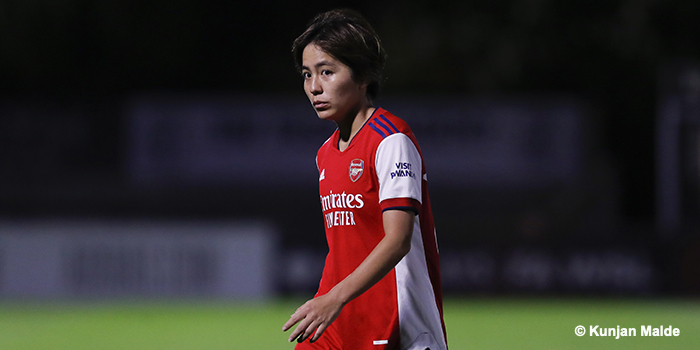Mana Iwabuchi made her professional debut in Japan at 14 and won the World Cup at the age of 18. After a couple of failed attempts to sign the Japanese schemer that her good friend Vivianne Miedema describes as “a wee baller,” Iwabuchi finally arrived in North London last summer. Ahead of Arsenal Women’s Emirates Stadium double header against Spurs and Wolfsburg in March, Iwabuchi sat down to discuss her career and life at Arsenal. How much did her good friends Lisa Evans and Vivianne Miedema influence her transfer? “A lot!” she laughs.
Mana Iwabuchi has been the face of Japanese women’s football since her mid-teens. Affectionally nicknamed ‘Manadona’ due to her slight stature and her ability to slalom between opponents, she came to prominence at an early age and has maintained her standing in Japan. Mana puts a lot of her success down to her childhood playing football with her brother Ryota, who is three years her senior and is also a professional footballer in Japan.
“He was a huge influence,” Mana explains. “He is a professional so you can appreciate that he is a really good player, he was my target when I was growing up, it was something for me to aim for. He was kind of like my rival, that’s what I really remember, I really wanted to try to beat him!” That sense of sibling rivalry served Iwabuchi well and she found that she quickly worked through the age groups with other girls as a teenager.
“When I was 13, I started playing in the older age groups and at that age I got into the U-16 National Team and at that point I realised that I might be able to play football professionally.” Mana made her professional debut at the age of 14. The pinnacle of her career also came early, she came on as a substitute in the 2011 World Cup Final as Japan defeated the USA on penalties to lift the trophy.
Japan and the US met in the final again four years later, meaning Mana had played in two World Cup Finals by the time she was 22. In 2015 however, the US were too strong and took the title with a 5-2 victory (Iwabuchi’s Arsenal teammate Tobin Heath was on the score sheet for the US on that occasion). I ask Mana whether the enormity of achieving so much so young and becoming a figurehead for Japanese women’s football has ever dawned on her. “No, not really,” she says breezily. “I didn’t really feel the pressure, I am not the type of player to feel pressure.”
By 2012, Iwabuchi was ready for a change of scenery and decided to challenge herself by coming to Europe. She signed for Hoffenheim in Germany at the age of 19. “I went to a language school when I got to Germany and I would say it was two years before I could converse properly, to have a proper conversation with someone in German,” she points out. “In terms of the general acclimatisation, I was really lucky to be surrounded by great people.
“Life in Germany was really good and everyone helped me a lot. The language was the only difficult part, the life and the football were all pretty easy to adapt to to be honest.” After two strong seasons with Hoffenheim, Bayern Munich snapped her up and despite her spell in Munich being interrupted by injuries, she won two Bundesliga titles alongside current Gunners Lisa Evans, Vivanne Miedema, Manu Zinsberger and Viki Schnaderbeck. Iwabuchi struck up a strong friendship with all of them but Evans and Miedema quickly became two of her best friends in football.
“At Bayern, they just really helped me out a lot in the beginning, whenever they went out, they would ask me to come with them,” Mana remembers. “We just had a bond pretty quickly. On a football level we really connected as well, I found it really enjoyable to play with them and I think we see the game in a similar way. I am really happy to have been able to play with them so much in my career and to be playing with Viv again now.”
Miedema told Suzy Wrack of the Guardian back in September, “Mana is one of my best mates off the pitch but she’s also one of the only players in my career where within a session at Bayern that click was there. We just understand each other, we feel each other.” I ask Mana how influential Evans and Miedema were in her decision to join Arsenal and she immediately breaks into a grin. “Yes, a lot!
“I asked a lot of questions to both of them about Arsenal and they asked me to come and join them on a number of occasions. Not just recently but before I signed here, we often talked about it. I came to the UK alone for a trip about three or four years ago as well, just to have a holiday and watch some football and we were in touch- we always kept in touch after Bayern. I had lots of conversations with them about playing in England and playing together.”

Arsenal had a few attempts at signing Mana before they were able to finalise the deal last summer, as reported extensively by Arseblog News during that period. Iwabuchi explains that the timing just didn’t quite work out for the club’s first couple of approaches. “Because of the Olympics, it was difficult for me to move here initially, the dates for the football season changed in Japan and that also made it a little difficult, the timing wasn’t quite right.”
The postponement of the Tokyo Olympics by 12 months due to coronavirus complicated things further. Iwabuchi eventually signed a six-month contract with Aston Villa in January 2020. “I went to Aston Villa and I knew I wanted to try to step up if I could after that, I didn’t necessarily know there would be an opportunity with Arsenal but stepping up was something I had in mind. In football terms, Arsenal just fits, it fits me as a player more than a lot of other big teams. It was an easy decision to come here when that opportunity came.”
The move to the WSL marked her return to Europe after spending three years back in Japan, leaving Bayern Munich a year before the end of her contract in 2017. Mana says she always had a return to Europe in mind. “I have always wanted to play in Europe for as long as I am good enough because I think that develops me as a player and as a person. But I got quite a few injuries in Germany and I needed to go back to Japan to have some operations.
“We were coming up to the Tokyo Olympics as well so it was a good time to build the excitement about the women’s National Team back home so it felt like a good time to go back for that period but I was always interested in playing in Europe again.” After a few months at Villa, in which she helped to steer the team away from relegation, Mana and Arsenal were finally able to make the transfer work.
Arsenal currently sit top of the WSL and have an exciting Champions League quarter-final clash with German giants Wolfsburg on the horizon, with the home leg to be played at Emirates Stadium. Iwabuchi says that Champions League nights were part of the draw of coming to Arsenal. “I always wanted to play in the Champions League, I had never played in the Champions League before I came to Arsenal, it’s been such a great experience this season.
“We are all really looking forward to the game against Wolfsburg, I am especially looking forward to it having played in Germany for so many years. We should have another really big crowd at the Emirates and I am sure the crowd will really push us, we will need that because Wolfsburg are a great team.” Iwabuchi already has experience of playing at the Emirates of course.
The Gunners have already played Chelsea there in the WSL as well as Barcelona in the Champions League. Mana says the 3-2 victory over Chelsea in September, in which she set up Beth Mead for the crucial third goal, felt like her arrival as an Arsenal player. “The Chelsea game was such a fantastic game; it’s such a great stadium and we had a really great crowd. That game felt like I had really arrived at Arsenal, I felt like an Arsenal player. It was such a great feeling. It’s such a great plus to play here and I would love to play as many matches here as possible.”
If Mana Iwabuchi’s career tells us anything, it is that she relishes the biggest stage.
Arsenal Women play both Wolfsburg and Tottenham Hotspur in March and both games are to be hosted at Emirates Stadium on 23rd and 26th March respectively. Tickets are on sale now and discounted packages are available if you buy for both games.





Great to see some great Japanese players thriving in both the womens and mens teams!
I agree. I’ve noticed lot of Japanese footballers seem to be very much team players and well drilled tactically/technically and don’t seem to take long to adapt to different leagues/styles. Also I’m biased because I like Tomiyasu so much!
Best of luck to her
Iwabuchi and the relationship she has with Viv are key to the way we’ll end this season.
Hands down, a favourite player.
She seems to approach life (and football) with joy not fear. Having had a decent mid season break since the Asia Cup her input could be vital in opening up the “park the bus” defences” that will come our way in the WSL run-in.
Schemer ?
Buchi!!